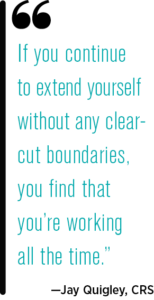Establishing boundaries for clients and other agents is necessary to maintain a good work-life balance
By Myrna Traylor
Real estate agents rely on client service and communication as the backbone of their business.
As such, agents may feel they must allow clients unfettered access to them day and night, vacations and holidays. But that kind of “super-availability” may not be the best choice—moreover, it may not be necessary in order to have a thriving business and happy clients.
Agents are finding that it may be in their best interest to set reasonable boundaries with clients to safeguard their time and ability to perform well. Some agents have set those time boundaries over the course of their careers, while others may need to shift as client demands on their time become unworkable. While setting boundaries for your time is important for work-life balance, it also supports being treated as a professional.
 Jay Quigley, CRS, broker associate at Florida Executive Realty in Tampa, Florida, and immediate past president of Greater Tampa REALTORS®, sets the problem in clear terms. “If you continue to extend yourself without any clear-cut boundaries, you find that you’re working all the time. You’re taking calls and texts at all hours of the night,” he says. “The customer or client has the impression that they should have an instant answer—almost like turning on Netflix, picking a movie and boom, there it is. We should operate as agents who are in demand, not agents on demand.”
Jay Quigley, CRS, broker associate at Florida Executive Realty in Tampa, Florida, and immediate past president of Greater Tampa REALTORS®, sets the problem in clear terms. “If you continue to extend yourself without any clear-cut boundaries, you find that you’re working all the time. You’re taking calls and texts at all hours of the night,” he says. “The customer or client has the impression that they should have an instant answer—almost like turning on Netflix, picking a movie and boom, there it is. We should operate as agents who are in demand, not agents on demand.”
That sentiment is echoed by Stacy Hiers, CRS, broker associate at RE/MAX Realty Consultants in Greensboro, North Carolina. “People expect us to be on call all the time, and that’s not realistic. If we need a doctor after hours, we have to go to the emergency room; we don’t go to our regular doctor. If we need dry cleaning after hours, we can’t walk in and get it. We have to conform to business hours for other professionals. Why can’t [agents] be treated as professionals with business hours and boundaries and let people know those expectations?”
Getting the message across
Agents have different ways of informing their clients about their business hours to ensure boundaries are respected during transactions. Some, like Quigley, do it as part of introductory meetings. “It starts at the initial consultation by clearly defining [your hours of availability],” he says. “That’s the perfect time to mention it. And don’t be afraid that somebody will fire you because you set boundaries.”
You can reinforce your availability in your outgoing voicemail message by saying, “If you are calling after 7 p.m., I will respond to your message at the start of the next business day.” Of course, this doesn’t mean an agent cannot respond if something is truly urgent. Hiers lets her clients know that she activates “the ‘do not disturb’ [function] on my phone automatically from 9 p.m. to 9 a.m. every day. And I will work outside of those hours when I need to or if I want to, but nothing is an emergency in real estate.”
Letting people know what to expect early in the relationship is important, especially since clients who rely heavily on text messages may assume that you will respond more or less immediately.
Part of your safety mindset
Shawna Neuner, CRS candidate and owner-broker/salesperson at Boulevard Realty in Columbia, Missouri, became even more careful about setting boundaries when a buyer she was working with crossed the lines of their business relationship after the transaction was complete. Neuner was surprised when this buyer started showing up at the local businesses Neuner had referred her to, such as the manicurist and hair salon, at the same time Neuner was there for her own services.
The most intrusive moment occurred when the buyer and her husband pulled into the driveway of the lake house where Neuner and her husband were spending the weekend, uninvited. Neuner realized then that the other meetings hadn’t been coincidental.
“I didn’t tell people where I’d go [at the lake]; that is one of my boundaries,” she explains. “Well, over various conversations, she had tracked me and put together enough information. So, we showed up one weekend, and they pulled in behind us and wanted to hang out.”
When gentle hints that Neuner did not welcome the couple didn’t work, “We had to finally bluntly say, ‘We’re down here for our time. We need you to go ahead and go.’ And that didn’t end it. It took several more conversations until I finally had to say, ‘Look, this is very uncomfortable. If you do this again, I’m going to have to contact the police.’”
“It’s hard for some people to understand the difference between friendly and friends,” Neuner says, when she would engage in normal small talk, inquiring about a sick pet, for example. “I started to recognize that some people would not understand and take it to be more.” She says that if her “Spidey senses” are tingling, she brings in another agent for meetings or holds conversations in the office to keep everything business-like.
Just remember to be fair and consistent with your boundary-setting, no matter the client’s price point on their home sale or purchase. “I don’t treat them any differently, whether they are buying a million-dollar property or $200,000 property. To me, it’s still the same,” says Hiers.
Pro Tips for Boundary Setting
Greg Hanner, CRS, broker/owner of Garden Realty in Waterford, Connecticut, shared a few ideas that can make the process of controlling access to your time a bit easier.
- “Make your availability public using Calendly or another public-facing platform and have links to your schedule everywhere (email signature, website, texts, business cards, etc.). The key to making this work is putting personal obligations in your calendar to block those times off for your family or friends.”
- “Pause and turn off your availability for inbound leads when you know you won’t be available. This actually helps with your ranking with buyer lead sources like HomeLight, UpNest, OJO, Opcity and Zillow.”
- “I give Kim Cameron, CRS, credit for providing a good rationale to clients pressing for full access. She says, ‘I want you to get the best of me, not what’s left of me,’ after a long day. Our hours often start before buyers and sellers want to talk in the morning, and we often extend our work into evenings beyond business hours. Let clients know it’s OK to contact you outside of your pre-defined hours (if you can silence your phone at night or leave it outside your bedroom), and they can and should expect a response within 24 hours.”
Check out our free webinar, Stop Overwhelm, Avoid Burnout, hosted by Maura Neill, CRS, and Real Grader at CRS.com/education/education-catalog.
Photo: Getty Images/visualgo/deepblue4you/ irem soyler








